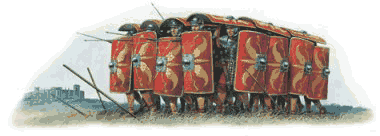Needlefelt Combat Rules
and Weapon Construction:
Re-Creating the Atmosphere
of Ancient Battle
BASIC Needlefelt Combat System Rules
Here is a website that covers making Needlefelt Combat Sytemw eapons (NFS).
Every participant must understand the risks inherent and takes them upon him or herself. A signed "Assumption of Risk" is required before you can commence combat.
Participants should understand the rigors of mock combat and be in good health. RomanTimes or the event sponsor will not be liable for injuries, accidents, or health problems brought on by NFS (Needle Felt System) combat or personal health issues. The basic rules of NFS, site specific rules may apply. A required inspection of NFS weapons and a safety demonstration will be held prior to combat.
Every participant must use:
- Goggles
- Thick Focale
- Appropriate Armor for impression
- Approved NFS Weapon
- Common Sense
Every NFS weapon will be tested for design and safety. These weapons will be checked for excess weight, construction, and will be thrust and struck against a solid object multiple times in an attempt to cause it to fail. Any NFS weapon that shows inner rods or excessive wear will not be allowed.
The NFS has always been a "counting coup" strike system. This is based upon the honor of the individual and the ability to "place" a hit on your opponent instead of striking or injuring them. Heroic over the head shield crushing strikes or diving into formations with sword swinging without regard for the safety of your fellow human will get you removed from the event
If all of us are very careful, accept any "good hits" that are dealt us and respect each other we can have a good time. If a Roman or Celt spears you in the chest for the second time...(lorica be damned.. this guy has skill...) FALL Down...take the hit.
We are having FUN. Arguing about hits stops the action and spoils the fun of
it, so just DIE DAMMIT!
YOU ARE NOT GOING TO CHANGE HISTORY.
NSF Strike Rules:
- Intentional head strikes are discouraged, torso strikes and jabs preferred.
- No intentional strikes to the face.
- No Intentionalstrikes to the groin.
- No Intentional strikes to the neck.
- No participant will intentionally try to harm another.
NSF Combat Weapon Regulations:
- Spears must be constructed within these size and weight parameters
-
Light infantry javelins (throwing spears used primarily for long
distance missile combat):
Shaft outside diameter (OD) — 1/2 to 5/8 inch
Total length including head — Between 60 and 40 inches
Weight: Less than 6 ounces (170 grams) -
Medium infantry spears (shafted weapons which are used for both
throwing and thrusting, including Roman pila):
Shaft OD — 3/4 to 7/8th inch
Total length including head — Between 90 and 64 inches.
Weight: Less than 14 oz. (397 grams) -
Heavy infantry spears (shafted weapons which are used for
thrusting/standoff defense but never thrown):
Shaft OD — 1 to 1.125 inch
Total length including head — Between 102 and 90 inches.
Weight: Less than 24 oz. (680 grams) - No mock weapons with shafts of wood or PVC pipe should be constructed after the date of the publication of these regulations, nor new designs submitted incorporating these materials. The recommended material for all spear and pilum shafts is cross linked polyethylene (PEX) pipe
- All NF spears must be tipped with heads that have a combination of shape, softness, and flexibility sufficient to prevent injury or shock from the impact of the weapon when thrown or thrust. Heads must be covered with materials that do not present edges that can cause paper cuts or other lacerations.
- Medium and heavy NF spears must be tipped or enclosed on the butt end by rounded caps or blunt cones made of pliable materials.
- NF spear shafts must be colored or covered to simulate being made of painted or natural wood.
- 7. All NF spear designs not specifically described in Roman Times guidelines must be approved by the administrative board, including all new designs and designs used prior to 2015.
- NF weapons may be inspected and rejected for use if flaws or damage which could pose a safety risk are observed.












